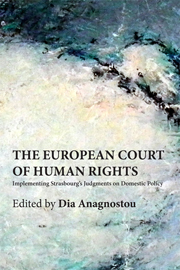Book contents
- Frontmatter
- Contents
- The contributors
- Acknowledgements
- Introduction: Untangling the domestic implementation of the European Court of Human Rights' judgments
- Part I INSTITUTIONAL DYNAMICS OF DOMESTIC IMPLEMENTATION
- Part II LEGAL MOBILISATION AND THE POLITICAL CONTEXT OF IMPLEMENTATION
- 4 European human rights case law and the rights of homosexuals, foreigners and immigrants in Austria
- 5 Political opposition and judicial resistance to Strasbourg case law regarding minorities in Bulgaria
- 6 Under what conditions do national authorities implement the European Court of Human Rights' rulings? Religious and ethnic minorities in Greece
- 7 A complicated affair: Turkey's Kurds and the European Court of Human Rights
- 8 The European Court of Human Rights and minorities in the United Kingdom: catalyst for change or hollow rhetoric?
- 9 Politics, courts and society in the national implementation and practice of European Court of Human Rights case law
- List of European Court of Human Rights judgments and European Commission on Human Rights cases
- Index
9 - Politics, courts and society in the national implementation and practice of European Court of Human Rights case law
from Part II - LEGAL MOBILISATION AND THE POLITICAL CONTEXT OF IMPLEMENTATION
Published online by Cambridge University Press: 05 April 2014
- Frontmatter
- Contents
- The contributors
- Acknowledgements
- Introduction: Untangling the domestic implementation of the European Court of Human Rights' judgments
- Part I INSTITUTIONAL DYNAMICS OF DOMESTIC IMPLEMENTATION
- Part II LEGAL MOBILISATION AND THE POLITICAL CONTEXT OF IMPLEMENTATION
- 4 European human rights case law and the rights of homosexuals, foreigners and immigrants in Austria
- 5 Political opposition and judicial resistance to Strasbourg case law regarding minorities in Bulgaria
- 6 Under what conditions do national authorities implement the European Court of Human Rights' rulings? Religious and ethnic minorities in Greece
- 7 A complicated affair: Turkey's Kurds and the European Court of Human Rights
- 8 The European Court of Human Rights and minorities in the United Kingdom: catalyst for change or hollow rhetoric?
- 9 Politics, courts and society in the national implementation and practice of European Court of Human Rights case law
- List of European Court of Human Rights judgments and European Commission on Human Rights cases
- Index
Summary
Since the Second World War, and especially over the past twenty years, the evolution of the transnational human rights regime centred on the Convention has been one of the most remarkable institutional transformations in Europe. It embodies a highly successful transnational legal system with far-reaching consequences for European and national governance. In its genesis, the Convention regime was the creature of state governments, which also determined with their decision-making its institutional remoulding over time. At the same time, though, its evolution into a ‘constitutional instrument of European public order’ has been a multi-dimensional phenomenon. Its construction and operation has involved dynamic processes of interaction engaging various national authorities but also non-state social actors, both individual and collective.
The present volume has sought to identify and explore the factors and conditions that determine the implementation and domestic impact of the ECtHR's judgments, and the variable patterns of influence that they exert upon national laws and policies. While national authorities promptly institute measures and pursue reforms called for by the ECtHR's judgments in some cases, they procrastinate or resist doing so in others. But variation is also qualitative, as the adopted measures in response to some judgments may be directly appropriate to the underlying rights issue or dispute at stake, or conversely, they may be extraneous or only tangentially related to it. By contextualising implementation in its domestic institutional and societal context, the contributions shed light on the multi-faceted ways in which the ECHR system and its Strasbourg-based judicial arm penetrate and impact upon national legal and political orders.
- Type
- Chapter
- Information
- The European Court of Human RightsImplementing Strasbourg's Judgments on Domestic Policy, pp. 211 - 231Publisher: Edinburgh University PressPrint publication year: 2013



